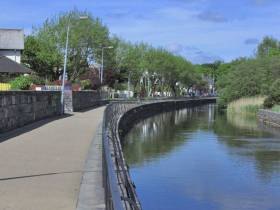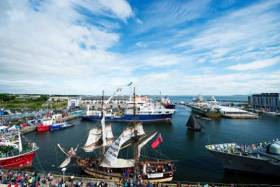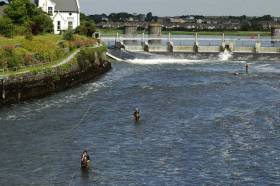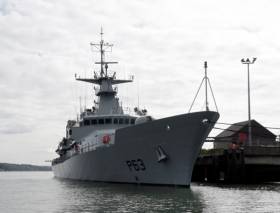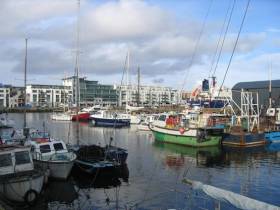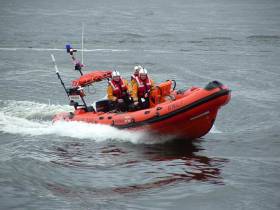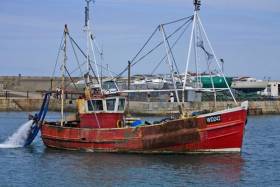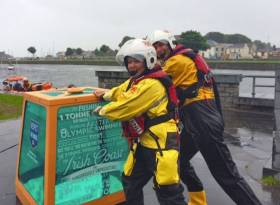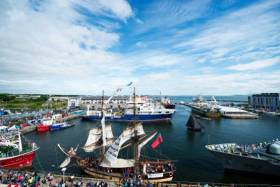Displaying items by tag: Galway
RTÉ’s Building Ireland Explores The Eglinton Canal
#InlandWaters - The most recent episode of RTÉ One’s Building Ireland looks at the construction of the Victorian-era Eglinton Canal, as Galway Bay FM reports.
A commercially successful waterway in its day despite its short length, less than a mile between Galway Bay and Lough Corrib, the Eglinton Canal’s story goes in tandem with that of NUI Galway, founded in the same decade as Queens College, and the programme explores their dual significance to the City of the Tribes.
Episode six of the current series of Building Ireland was first broadcast last Friday evening on RTÉ One but is available on RTÉ Player till 4 December.
Galway Hosts Atlantic Action Plan & Marine Economics Conferences
#BlueGrowth - Galway's Marine Institute will host the third Irish national event of the support team for the Atlantic Action Plan on Thursday 24 November.
Under the theme of ‘Linking the Atlantic Strategy and Current Funding Opportunities’, this event is aimed at anyone with an interest in developing projects related to the marine and maritime sectors in line with the Atlantic Action Plan. The official event website has more details.
Also on 24 November, Galway’s Glenlo Abbey Hotel is the venue for the seventh Marine Economics and Policy Research Symposium, hosted by the Socio-Economic Marine Research Unit (SEMRU) of NUI Galway’s Whitaker Institute.
This free event will provide participants with an update on a wide range of policy topics related to the marine sector in Ireland, with a particular focus this year on the valuation of marine ecosystem services benefits to society.
Speakers will include Prof Nick Hanley of the Marine Alliance for Science and Technology Scotland (MASTS); Dr Ronan Lyons of Trinity College Dublin; and Dr Kathrine Skoland of International Research Institute of Stavanger, Norway.
More information on the day will be circulated in the coming weeks, and early registration is available HERE.
SeaFest Returns To Galway In 2017 & 2018
#SeaFest - Ireland’s national maritime festival will return to Galway Harbour for the next two years, according to the Galway Independent.
The news follows the success of this summer’s SeaFest, which brought more than 60,000 visitors to Galway to see such attractions as tall ship The Phoenix.
Cork Harbour hosted the inaugural SeaFest in 2014 in tandem with the Our Ocean Wealth Conference, which will also return to Galway in 2017 and 2018.
The Galway Independent has more on the story HERE.
Galway Anglers Voice Opposition To Proposed City Ban
#Angling - Galway anglers are mounting a protest against proposals to ban fishing in public spaces around the city, as the Connacht Tribune reports.
Both the Galway Bay Sea Angling Club and Galway City Salmon Angling Association have written separately to Galway City Council expressing their opposition to a draft bye-law that would prohibit angling “in any part of a park or open space” without prior written permission.
This would include areas popular with anglers such as Ballyloughane, Silverstrand and Blackrock, as well as the ‘high bank’ between the Salmon Weir and O’Brien’s Bridge in the city centre.
Anglers argue that any such ban on fishing in Galway would be costly to the economy that hinges on the sport, from tourism to the city’s tackle shops.
The Connacht Tribune has more on the story HERE.
Newest Naval Service Vessel To Be Twinned With Galway Next Month
#Navy - Taoiseach Enda Kenny will officiate the twinning of the new Naval Service vessel LÉ William Butler Yeats with the city of Galway on Monday 17 October, as the Connacht Tribune reports.
The City of the Tribes was previously linked with the LÉ Aisling, which was decommissioned this past summer and is now being proposed as the home of a floating museum in Galway Docks.
Designed by Vard Marine and built by Babcock Marine in Appledore, north Devon, LÉ William Butler Yeats is in the same class OPV90 as sister ships LÉ Samuel Beckett and LÉ James Joyce, delivered in 2014 and 2015 respectively.
On a visit to the new vessel in Haulbowline last month, Defence Minister Paul Kehoe described its arrival and entry into service as "another key milestone in the history of the Naval Service".
Galway Potentially Losing Millions Over Lack Of Harbour Marina
#Galway - Galway is missing out on millions of euro annually due to a lack of modern marina facilities, according to a top Irish sailing executive.
Pierce Purcell of Galway Bay Sailing Club told the Connacht Tribune that investment in Irish sailing, which resulted in Olympic silver for Annalise Murphy in Rio this month, needs to go into infrastructure as well as high performance.
“Galway has been very far behind the rest of the country in terms of facilities and access," said Purcell, a director of the Irish Sailing Association, who described current facilities for visiting boats in the city as "very poor".
While he welcomed the expanding marina at Rossaveal west of the city in Connemara, and the multi-million-euro facilities in the Aran Islands that will host next summer's WIORA, Purcell said the opportunity was missed to match those developments with upgrades in Galway Harbour, especially in the wake of its hosting of the Volvo Ocean Race in 2012.
The Connacht Tribune has more on the story HERE.
Galway Lifeboat Tows Vessels To Safety At Renville
#RNLI - Galway RNLI's lifeboat was launched on Saturday evening (20 August) after two yachts and a half-decker got into difficulty at Renville on Galway Bay.
The alarm was raised by the Irish Coast Guard shortly after 6pm after a 40ft yacht, a 32ft yacht and a 25ft half-decker ended up on the shore at New Harbour.
Although conditions were rough with choppy waters and Force 6 winds, Galway RNLI's volunteer crew managed to tow all three vessels to safety, assisted by crew on the vessels.
The lifeboat crew first towed the half-decker to safe waters and deployed its anchor before towing the two yachts, one behind the other, out to the half-decker, tying one of them to the smaller vessel so that they could tow the other to a safe mooring.
The crew then repeated this operation with the second yacht, untying it from the half-decker and towing it to a safe mooring. Finally they towed the half-decker back to the quay at Galway Bay Sailing Club.
No one was injured in the incident and only minor damage was caused to one boat.
"This rescue operation took quite some time as the weather conditions were not very favourable," said Galway RNLI lifeboat operations manager Mike Swan.
The volunteer crew on this call out were helm Kieran Oliver, John O’Sullivan, Leanna McHugh and Greg Cullen.
Marine Notice: Dregding Works At Rossaveal Fishery Harbour Centre
#MarineNotice - The latest Marine Notice from the Department of Transport, Tourism and Sport (DTTAS) advises of the of the dredging of soft material and disposal at sea, drilling and blasting and removal of bedrock, construction of breakwater and revetment and other associated works at Rossaveal Fishery Harbour Centre.
The works by Cronin Millar Consulting Engineers at the Galway Bay fishing harbour will commence on tomorrow Monday 22 August and continue till January 2017.
The first phase of the works, commencing tomorrow, will comprise the construction of a temporary causeway on the foreshore within the dredge site to facilitate excavation of seabed and disposal at a licensed on-shore site.
The second phase of the works, will commence in the coming weeks and will involve a jack-up barge, floating barge, safety boat, personnel boat, split barge and work boats. This will be advised under a second marine notice.
Maps and co-ordinates of the work areas are detailed in Marine Notice No 34 of 2016, a PDF of which is available to read or download HERE.
Other recent Marine Notices cover outfall pipeline remedial works ongoing at the Corrib gas field, and information on the carriage of inflatable life rafts on small fishing vessels under 15m.
#RespectTheWater - The RNLI has placed a tonne of water in Galway and Dun Laoghaire respectively for the summer months in a bid to show visitors and locals alike the power of the water, river and sea.
The tonnes of water, which will be located at the Spanish Arch in Galway and Dun Laoghaire's East Pier until the end of August, forms part of the RNLI’s Respect The Water campaign.
Each tonne is printed with important advice about the power of water, such as how fast a rip current can flow. They will also demonstrate to people how heavy a relatively small volume of water is – one cubic metre of water weighs one tonne.
They were created to be a visual and engaging way of delivering this message that no matter how strong a swimmer you might be, you are no match for the power of the water.
Last month the RNLI launched its annual national drowning prevention campaign, Respect The Water, and this year the charity is warning the public to watch out for key dangers that can catch people out in or near water.
Second Annual SeaFest Nets 60,000 Visitors In Galway
#SeaFest - More than 60,000 visitors flocked to SeaFest, Ireland's national maritime festival, this past weekend to enjoy an action-packed programme centred on Galway Harbour.
Marine Institute chief executive Dr Peter Heffernan said he was delighted at the public response and at the enthusiasm for Ireland's marine heritage that underpinned the festivities.
"SeaFest is all about is increasing participation and engagement with the sea, showcasing Ireland's abundant maritime resources and celebrating our proud maritime heritage," he said.
"As the crowds in Galway showed, the sea is a fantastic source of fun and entertainment and we were thrilled to see so many people – locals and visitors alike – join in the spirited marine-themed fun."
Dr Heffernan added that the second annual SeaFest, following Cork Harbour's hosting of the inaugural event last summer, was "a hugely ambitious venture and Galway rose to the challenge of providing a fabulous weekend which both informed and entertained."
Among the scene-stealing excitement on the water was the spectacle of the Galway Hookers' challenge for the Galway Plate; the arrival of the gracious tall ship Phoenix; and Frank Bölter sailing his quirky large scale origami paper boat into the harbour in partnership with TULCA for Galway 2020.
On dry land, meanwhile, Bord Iascaigh Mhara and Bord Bia's seafood extravaganza was packed with natural produce and cookery demonstrations by celebrity chefs, alongside tours of ocean-going vessels and the Marine Institute's 'Our Wild Atlantic – What Lies Beneath' marquee with its interactive exhibits on marine life and creatures of the deep.
Significantly, SeaFest also brought to the city a major focus on research and the marine economy with a number of marine-related business and research events taking place in the lead-up to the public festivities.
The third annual Our Ocean Wealth Conference allowed speakers and delegates of national and international status to delve more deeply into the theme of 'Innovating for our Marine Future', exploring and strengthening Ireland's maritime heritage, economy and identity.
New Marine Michael Creed also welcomed the success of SeaFest, which ran from Thursday 30 June to Sunday 3 July and played host to 750 conference delegates from Ireland, Europe and the USA among the thousands of visitors.
Minister Creed, who spoke at the BIM Seafood Conference, the Marine Industry Awards ceremony and the Our Ocean Wealth Conference, said: “I was greatly encouraged by the energy and enthusiasm which I witnessed at the various events at SeaFest.
"The large attendance of delegates, the quality of presentations at the various events and the general desire to move forward the development of Ireland’s marine economy was very impressive.
"However, the huge response by the Irish people to the public events at SeaFest, with a record breaking 60,000 people attending on Saturday and Sunday, was the greatest testament to the high level of interest amongst the Irish public in all aspects of the marine.”
Minister Creed also launched the SmartBay Ocean Observatory, which will serve as a important element in the development of an Atlantic Ocean Observatory system and facilitate the test and demonstration of pilot-scale ocean energy devices in Galway Bay, before going on to further commercial development.
"The whole idea of SeaFest was to engage, examine and enthuse the public and policy makers about the potential for the development of our marine economy," said the minister.
"The Government strategy for the development of the marine economy is set out in the Harnessing Our Ocean Wealth integrated plan for the development of the marine in Ireland, and the success of last weekend’s SeaFest augurs well for the support and interest that exists to grow the marine economy in Ireland."



























